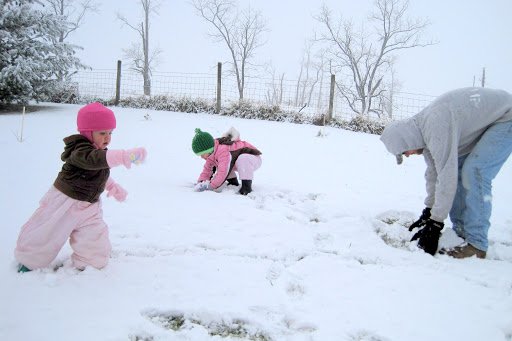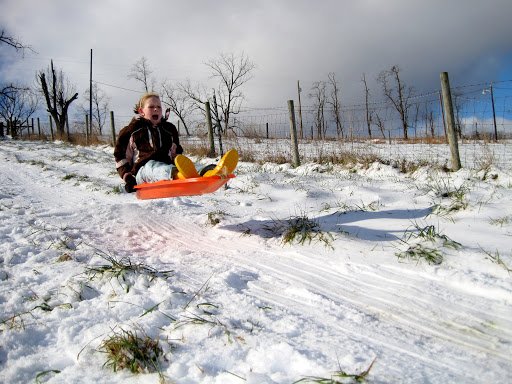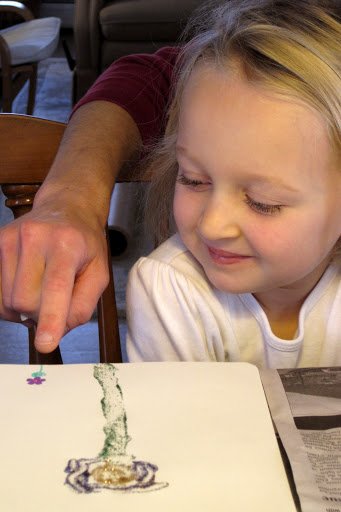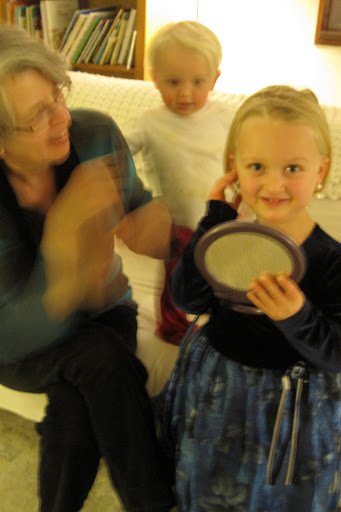Christmas vacation with snow is just the best, and so is having the cousins over for the fun:







Christmas vacation with snow is just the best, and so is having the cousins over for the fun:














Sometimes she even asks in her vocal if nonverbal way how to spell a word:


Earlier this week NPR’s morning news report moved seamlessly from the Connecticut school shooting to something like “the names of ten nine- to eleven-year-olds are still unknown”; after a moment of confusion I realized the story had changed to a bomb blast in Afghanistan.
Additional news compounds the season’s weightiness stateside: Calls for increased gun control measures encourage assault weapons purchases; the Westboro Baptist idiots talk about picketing the Sandy Hook Elementary School victims’ funerals.
It’s a heavy time for me as a parent and teacher–and I can’t even begin to imagine the grief now faced by families and the communities in Newtown or east of Kabul.
And it’s Christmas, when we sing about the Prince of Peace’s reign on Earth and proclaim that justice “shall guard his throne above, and peace abound below,” all of which “no end shall know,” lines from one of the five or so hymns I ever learned to play on the piano, the yuletidal To us a child of hope is born.
I believe in what that song is about, but not because God is my security chief. (If he were, I’d better get my head out of the sand real quick and start looking at other options; as far as I can tell, God isn’t doing a very good job of protecting the innocent.) Rather, I believe less in God personified or deified and more in Earth-grounded goodness that is life giving; the Christ child symbolizes hope for a better way of life that, while upside-down, cultivates that which is right.
It’s a messy theology, with few clear-cut answers and lots of human obligation; my Christmas hope cannot be removed from humanity’s roles as justice guarders and peace abounders.
Yet hope I do: that even in the inevitability of our vulnerability to nature, each other, and ourselves, all that is life giving will increase and know no end.
My governor wants to bundle teacher raises next year with policy that makes it easier for under-performing teachers to be fired. A raise would be grand, say teachers, but anything that challenges tenure is a no-go.
This response by teachers devalues our profession.
If teachers think the work we do is important enough to society to deserve more compensation–and think this we do, believe me–we must accept the fact that our role is also important enough to receive a little critical oversight that can snuff out ineffectiveness when merited.
Societal respect for and recognition of a profession is perhaps best reflected in high salaries. Teachers want that respect, but not at the cost of job security. Trouble is, the societal payoff for increased salaries is boosted competition for coveted jobs. That’s an easy okay for new hires, but holds limited impact if employers are not enabled to glean good faculty from the general educator base and let the rest move along.
The influence we teachers think we wield over our nation’s youngsters is notable. I face my sixty students for nearly ninety minutes every day for 180 days, thereby reigning over more than 16,000 childhood hours each year. If I do less than foster growth in each of my students during each of those hours, I have let down the kids and society–and myself.
Whether or not teachers are paid more, we’d better be good at what we do, and when a teacher’s work is sub par, worthless, or detrimental, that teacher needs to do some reinventing or find a road to hit. I’d prefer my car’s safety belts were manufactured and installed by someone who was good at doing that rather than by someone who was keeping their job only by paying union dues; mine is no trivial preference that my children sit under the tutelage of someone who teaches passionately and effectively rather than someone who is merely counting the days until summer break.
Certainly teachers need protection from inept or mis-motivated higher ups who might fire them unjustly, but the idea that teachers deserve unchallenged tenure is as misguided as the resistance teachers often grumble about being evaluated. Teachers in general dread classroom and walk-through observations by principals, and I admit that they still make me nervous, even though I’ve chosen to welcome them as–and have never experienced them as anything other than–opportunities to receive helpful suggestions and affirmation.
But more important than just reminding me that I’m not self employed is the underlying value that ongoing evaluation places on the work I do: for the sake of all, I am worth professional scrutiny.
While M and I cut and stacked firewood and H dozed in the van on Saturday, N used a pen from my parents’ truck, some scrap lumber, and “How do you spell…” to make these recipe blocks (she added the illustrations later in the day, after we got back home):

A radio interview I heard last week about spirituality seemed nothing more than an Evangelical Buddhist moment: Quoted statistics demonstrated nothing, anecdotes related nothing, and questions about insights resulted in no answers. I was left to work out my own sort of meaningful answer to the topic of the day.
And so here it is, unprofound and short though it well may be: To be spiritual is to listen.
Reading counts, certainly, at least if it’s of thoughtful content, as may being quiet and looking at nature and watching people and doing many other things, too, like listening.
Journaling may count, too, since putting thoughts into a notebook allows you to listen to yourself, but blogging for an audience really doesn’t, as it mandates outbursts of humor and irony that (as I learned in another less-than-satisfactory interview…sorry, it must’ve been a bad week at NPR) undermine sincerity and the very fabric of relationship in our society. It’s too noisy.
(Even N gets irony: As we drove down the road yesterday she bemoaned the fact that we hadn’t said goodbye to our dear dog. “You’re right,” I said, quietly adding, “Bye, Canela”–at which N gave her I-get-it “Ha-Ha.”)
There are many Biblical examples of silence and listening as spirituality: Jesus went off by himself quite a few times, apparently; Jonah had a (probably ranting- then listening-filled) run-in with the gastric elements of a godly super fish; and Jesus when questioned by Pilate wouldn’t say anything (even though Pilate did seem ready to listen, at the moment…I’m not sure which of the two guys was being more spiritual, just then).
And then, since it’s Advent, a time of expectation and hopefully listening for new spiritualesque adventions, there was Zechariah, surrounded by idiots who didn’t seem to realize that he was dumb, not deaf (“Then they made signs to his father, to find out what he would like to name the child.” That’s ironic, right?), after he disbelieved God’s right-hand bad-boy Gabriel’s letting him know that Zechariah’s dear wife of many years and he would conceive someone relevant to the world. He’d gotten a bit testy and hadn’t replied to the message with a simple “Yessir,” so good old Gabe saw fit to mandate a bit of shut-mouth for the big Z.
There are lots more examples, I’m sure. Like the time Loretta Lynn was working in her garden in Coal Miner’s Daughter and told her own daughter something like, “Hush, now, darling, Mommy’s working on a song,” which sort of happened to me except that I was rototilling and wearing ear plugs while working on a song, and I didn’t call myself “Mommy,” and no one was trying to interrupt me, and so really it wasn’t that difficult to listen to the artistic little voice inside me.
And there’s always the listening-based spiritual discipline of reading Joel Stein in Time and vacillating between wrinkling my brow, blushing, and nodding enthusiastically. That last part happened to me once, at least, when he wrote rather funnily about our society’s too-much reliance on humor, which is, by the way, I think, the essence of what the anti-irony lady on NPR back in my fourth paragraph was saying.
(Speaking again of irony, Time had a great “don’t worry about the death of irony” factoid: Romney’s share of the popular vote was around 47%.)
Just in case you’re tired of listening to others’ rampages and causes and concerns–that might mean you’re not into spirituality, yet, although I’m sure you’ll grow into it eventually, if Gabriel has anything to say about it–maybe you can sign up with this guy. I’m going to show the flick to my students tomorrow, to remind them what irony is.
(I’d thought about showing them this whole post with its irony, for fun, but for public school it’s probably way too spiritual.)
I was sick for a few days, like six of them, and in many ways I enjoyed it.
N had just been sick, so she knew what it was like, and was very caring. She decided to keep me toasty one day, with every blanket she could find.
My head is to the right, cropped out of the picture because I was, as is my general practice when anything’s wrong with me, looking as pained and dead as possible.
But I was too busy sweating to die, at the moment:

Ubuntu is cool, sleek, slim, chic, sexy, all of that. Plus it’s free, can run (slowly) off a CD, has a huge community of support, doesn’t require virus protection, and is slim, chic, sexy, and all of that. In the name of speeding up, glamorizing and expanding my digital experience while at the same time not spending money on a new computer, I decided to scrap Windows and go all Linux. Yippee!
However, after backing up my original configuration and swiping my hard drive, then installing that epitome of coolness and all that, I realized (yet again–I’d tried this before) its drawbacks for a simple user like me: while I can pretty much be okay without Photoshop even though Ubuntu’s GIMP isn’t quite as polished, and while I can (albeit begrudgingly) live without iTunes, I simply can’t live without Picasa (which Ubuntu/WINE doesn’t seem to fully support).
Furthermore, my video card upgrade upgrade wasn’t compatible with my computer’s specs and so I was left with quite crappily choppy graphics even after trying a lot of Ubuntu workarounds: Even after all my operating system shenanigans and hardware improvement attempts, I was faced with troublesomeness, both in terms of the video card and the fact that there is no way I want to spend my life working around when I’d rather be writing, or just doing whatever is the task at hand.
And so, since work in order to do work is a waste of my working brain space, a new computer–sporting Windows 8–is on its way home to me.
My electoral relief in spite of my personal vote’s insignificance as only 1/1,191,420 of the Libertarians’ 1% that needed to be 5% in order to bring about any real change didn’t mean my computer problems went away.
In fact, the new monitor I ordered, as our old one had fallen into a state of compulsive self destruction, very quickly highlighted the fact that the video card I just installed to free my world of green tint doesn’t support high enough resolution, and isn’t really supported by my version of Vista, either: I’ve sent away for an upgrade to my video card upgrade.
I’m also awaiting the new hard drive that I ordered as a replacement to one that I had ordered to replace my original; that first replacement, according to a computer lackey relative, seemed to be defective, so I coughed up the $2.80 to mail it back. Thankfully the price on Amazon for a new one had dropped enough so that even with having to pay shipping on the return, I’m getting a new one for, all told, a bit cheaper, by twenty-one cents.
And in the process of continuing to fiddle with my current hard drive, I realized that the original drive probably wasn’t very defective after all–I was able to recreate its most notable problem on my own, with just myself and my original drive, which I then had to restore from my backup for about the fourth time, twenty-hour process though it may be.
In the midst of such noteworthy events, National Geographic sent us a ridiculously tempting offer to subscribe for a year plus freebies for just under $16, our now gravel-covered driveway courtesy of my grandparents makes coming to our house less an economic boon for the local Land Rover dealer and more cushy-cushy, and a furry little friend chose somewhere in our upstairs bathroom wall or ceiling to rest once and for all, perhaps knowing that only in such secluded death could its presence in our house be both noticed and unharassed.
Of course meaning in life comes less–if at all–from any such things, and more from moments such as these:
